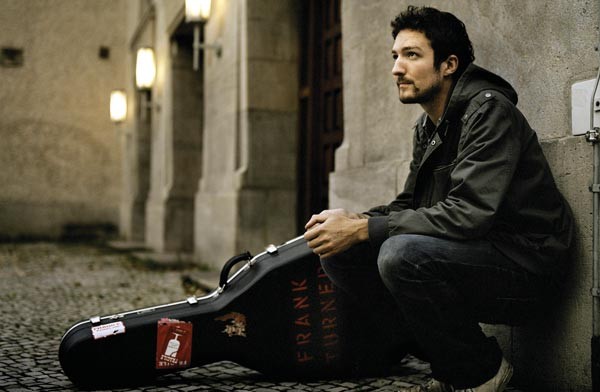Frank Turner came up in hardcore bands in England, but has become known worldwide as a folksinger with a punk bent, in the vein of Billy Bragg. His current tour stops at Mr. Small's Theatre; he spoke with City Paper from Burbank, Calif., where he is in the pre-production process for a new album, due out next year.
Where and when did you do the writing for this album? Is there a thematic string to the material?
I try not to get too analytical about the process or what I do, songwriting. In terms of sort of themes for records, I think the last record that I did, England Keep My Bones, it ended up being a record about England, and about mortality and this kind of thing. But I didn't sit down and go, "I am now going to write an album about the following things!" It was more a question of, once the body of work had sort of congealed around a central point. So, what this new record will be about still remains to be seen.
You blogged that you were feeling a little tentative about doing your recording in Los Angeles.
I think the wariness thing is just, it's such a kind of tired cliché — English band achieves a small degree of success, goes to L.A., blows a ton of money on a record, or, you know, adopts American accents and starts driving Cadillacs. I don't think of myself as a nationalist, but I think that my cultural Englishness is a big part of my identity, and of the music that I make — hopefully in the way that Springsteen is always from New Jersey, no matter which part of the world he's in.
You update your blog fairly regularly. It seems like communicating with the written word is important to you.
Yeah, I think that may well be true. A better way of putting it for me is maybe that I find it interesting. One of the positive effects [the Internet has had] in my view is that it sort of helps break down the barrier between performer and audience. I've never really been a fan of that kind of slightly Wizard of Oz-esque curtain between the world of being a musician, and the people who listen. And living in a world where the economics of the music industry is in such flux, I think it's good to inform everyone of the economic realities behind it. I think this is less the case now than it was a few years ago, but I still have kids come up to me in the bar and think since they've heard my song on the radio, I'm a millionaire.
So, to clarify, you're saying you're not a millionaire?
I am not a millionaire. This is a total aside, but I was at a festival in Germany the other day, and there was a German, like, hair-metal band playing, and they had a song talking about how they were in a band because they wanted money, sex and power. And I thought to myself, "Maybe the middle one, but options one and three — I think you're in the wrong job!"
You recently played the opening ceremonies of the Olympics. What was it like getting that call?
It was all very surreal. The opening ceremony was directed by Danny Boyle, the film director, of whom I am a big fan, anyway. My manager got a call from Danny Boyle, saying, "Can we have a meeting?" And obviously we said, "About what?" And they said, "We can't discuss it over the phone." Danny's a fan of my music — which was news to me, and kind of disarming. And he said, "Would you be up for playing some songs?" and I said ... "Yes." It was quite funny, actually. He said, "Don't answer me straight away; you can go away and have a think about it," and it was like, "I don't need to go away and think about it! I'll tell you right now what the answer is!"
One of the terms we throw around here to describe the music that you make is "folk punk." What's your relationship to that term?
I've always felt the genre terms serve a certain purpose up until the point when all the people in the current conversation have heard the music you're talking about, after which point, who gives a fuck? There's a large folk influence in what I do, there's a large punk influence in what I do, and if you put a gun to my head and asked me to describe what I do, I would probably tell you I was a country singer.
Is there something else that you want to do in life besides music?
This is definitely my number-one passion and I would absolutely love to be Neil Young when I'm older: to be old and still making records that have something to say, and all the rest of it. Whether or not that's going to happen, who knows? I think anyone with any degree of intelligence who's a musician has a Plan B. I've always said I want to be a history teacher — but I may now have too many tattoos to be a history teacher.














